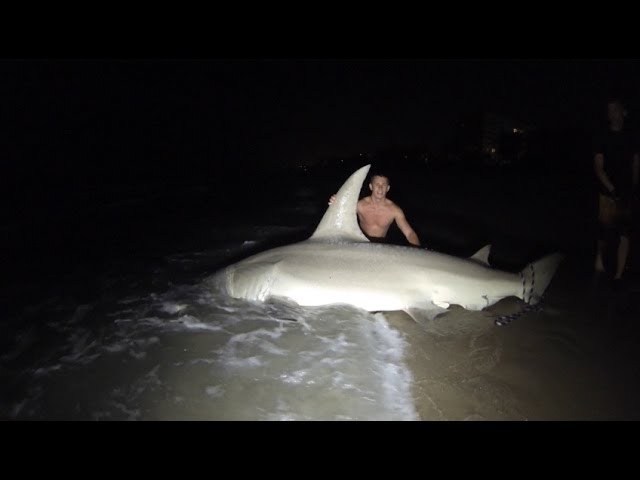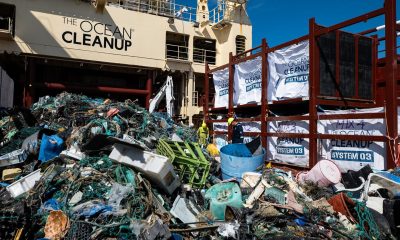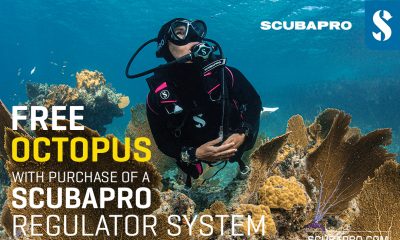News
Record-Breaking Hammerhead Landings Deadly And Possibly Illegal, Says Marine Biologist

Last month a 21-year-old man in Florida made international headlines for snagging a 13-foot hammerhead while fishing off the pier at Lauderdale-by-the-Sea. After his friend’s line bent hard and the huge fish was pulled in closer, Ryan Bolash dragged the shark onto a beach full of stunned onlookers.
“It was flailing around, everything like that,” one witness later said. “It was really cool.”
The famous snag was only the latest in a spate of recent high-profile hammerhead catches. But according to one marine biologist, the sharks’ lives were in danger and the fishermen were probably breaking the law.
In March a group of Florida Atlantic University students made headlines when they caught a 14-foot, estimated 700-pound hammerhead (and posted a YouTube video of the ordeal, now viewed more than a million times), and in February a man was featured on local television after winning a South Florida fishing tournament with his hammerhead catch.
All the fishermen expressed concern for the animals’ well-being and released the sharks. “They’re an amazing creature,” Bolash said. “I don’t know why anyone would want to hurt them.”
But the fishers also struggled for an hour or more with the animals to reel them in — hammerheads are renowned fighters — and took photos and measurements before releasing the sharks. Keeping the animals on land even for a few minutes can prove fatal, says a University of Miami marine biologist. And thanks to a 2012 law aimed at protecting the species — which is endangered — it’s also illegal.
“Think about if we were holding your head underwater for several minutes while scuba divers were taking a picture,” says David Shiffman, the biologist. “You’re not adapted to survive in that world.”
Of shark species, Shiffman says, hammerheads have among the highest stress responses to being caught. They fight instantly and vigorously, which makes the shark popular with fishermen looking for an adrenaline rush. But it also means hammerheads are more likely to die from the stress and fatigue of a protracted battle with a fishing line, even if they’re released promptly once they’re finally reeled in.
Shiffman is particularly miffed at those who brag of hours-long “epic fights” to bring in the hammerheads. “The ‘fight’ is the animal literally trying not to die,” he says. “[It’s] putting every bit of energy it has into not being killed.”
There’s no reliable hammerhead count available, Shiffman says, but he estimates the shark’s population has declined by as much as 90 percent since the 1970s. In 2012 the Florida Fish and Wildlife Conservation Commission passed a regulation prohibiting the killing of three varieties, including the great hammerhead, the largest. But the law also prohibits “landing” of the sharks, meaning it’s illegal to bring them ashore unless they are “immediately returned to the water free, alive, and unharmed.”
Keeping the hammerheads on the beach to measure them or pose for a picture, Shiffman contends, means the animals aren’t being immediately released, and the stressful fight to reel them in means they’re not left unharmed.
The biologist estimates that in recent years hundreds of hammerheads have been pulled ashore, often during the night or in unpopulated areas where the practice can go unnoticed.
“‘Oh yeah, of course we released it. We don’t want to hurt the animals,'” he said, mimicking the fishermen’s typical response. “But they’re using illegal actions that hurt the animals. Their heart’s in the right place, but their actions need to match it.”
Source: blogs.miaminewtimes.com
Blogs
The Ocean Cleanup Breaks 10,000,000 KG Barrier

The Ocean Cleanup, the global non-profit project, has removed a verified all-time total of ten million kilograms (22 million lbs.) of trash from oceans and rivers around the world – approximately the same weight as the Eiffel Tower.
To complete its mission of ridding the oceans of plastic, The Ocean Cleanup uses a dual strategy: cleaning up the Great Pacific Garbage Patch (GPGP) to remove the plastic already afloat in the oceans, while stopping the flow of plastic from the world’s most polluting rivers.
Through cleaning operations in the GPGP and in rivers in eight countries, the cumulative total of trash removed has now surpassed ten million kilograms. This milestone demonstrates the acceleration of The Ocean Cleanup’s impact, while underlining the astonishing scale of the plastic pollution problem and the need for continued support and action.
While encouraging for the mission, this milestone is only a staging point: millions more tons of plastic still pollute our oceans and The Ocean Cleanup intends to continue learning, improving and innovating to solve this global catastrophe.
This announcement comes as governments from around the world meet to continue negotiations to develop a new legally binding instrument to end plastic pollution at INC4 in Ottawa, Canada. Representatives of The Ocean Cleanup will be in attendance and the organization will be urging decision-makers to collaborate towards a comprehensive and ambitious global treaty which addresses plastic at all stages of its life cycle and in all marine environments worldwide, including in areas beyond national jurisdiction.
It is encouraging to see that the need for remediation is reflected in the various options for potential treaty provisions. It is essential that the final treaty contains clear targets for the remediation of legacy plastic pollution, and reduction of riverine plastic emissions.
Tackling plastic pollution requires innovative and impactful solutions. The treaty should therefore incentivize the innovation ecosystem by fostering innovations that make maximal use of data, technology and scientific knowledge – such as those designed and deployed by The Ocean Cleanup.
‘After many tough years of trial and error, it’s amazing to see our work is starting to pay off – and I am proud of the team who has brought us to this point.’ said Boyan Slat, Founder and CEO of The Ocean Cleanup. ‘While we still have a long way to go, our recent successes fill us with renewed confidence that the oceans can be cleaned.’
The Ocean Cleanup was founded in 2013 and captured its first plastic in 2019, with the first confirmed catch in the GPGP coming soon after the deployment of Interceptor 001 in Jakarta, Indonesia. After surpassing one million kilograms of trash removed in early 2022, the non-profit project has since progressed to the third iteration of its GPGP cleaning solution, known as System 03, and a network of Interceptors currently covering rivers in eight countries, with more deployments set for 2024.
About The Ocean Cleanup
The Ocean Cleanup is an international non-profit organization that develops and scales technologies to rid the world’s oceans of plastic. They aim to achieve this goal through a dual strategy: stemming the inflow via rivers and cleaning up the legacy plastic that has already accumulated in the ocean. For the latter, The Ocean Cleanup develops large-scale systems to efficiently concentrate the plastic for periodic removal. This plastic is tracked and traced through DNV’s chain of custody model to certify claims of origin when recycling it into new products. To curb the tide via rivers, The Ocean Cleanup has developed Interceptor™ solutions to halt and extract riverine plastic before it reaches the ocean. Founded in 2013 by Boyan Slat, The Ocean Cleanup now employs a broadly multi-disciplined team of approximately 140. The foundation is headquartered in Rotterdam, the Netherlands.
For more information, visit: theoceancleanup.com and follow @theoceancleanup on social media.
Marine Life & Conservation
Steve Backshall to headline Shark Trust’s flagship event: For the Love of Sharks

Join a host of amazing, shark loving, speakers including Steve Backshall and the Shark Trust team for an evening celebrating shark conservation at the Royal Geographical Society in London this November.
Date: 29th November 2024
Time: 6-10pm
Location: Royal Geographical Society, London
Tickets: https://www.sharktrust.org/Event/flos24
The event will be a celebration of all things shark. Those lucky enough to get hold of tickets will hear from engaging guest speakers with a passion for sharks.
The line-up includes (*subject to change if unforeseen circumstances arise)
Steve Backshall: One of television’s busiest presenters, BAFTA award-winning wildlife expert Steve has been passionate about the wild world ever since he was young.
Steve’s impressive TV career has taken him all around the world, investigating a wide array of species and environments. Steve has filmed over 100 hours of children’s wildlife programmes with the BAFTA award winning Deadly 60 franchise and recently, with Sky Nature, for his new series ‘Whale with Steve Backshall’. He has been a patron for the Shark Trust for 10 years.
Simon Rogerson: is a photojournalist specialising in natural history, diving and the sea.
He is editor of SCUBA magazine, the official journal of the British Sub-Aqua Club. Simon started his career as a crime reporter but gravitated towards his ‘less depressing’ interest in underwater exploration, joining the staff of DIVE magazine in 1999. In 2005 he was named ‘Editor of the Year’ in the PPA’s Independent Publishing Awards. Simon also works as a freelance writer, contributing frequently to the Sunday Times and Telegraph, in addition to BBC Wildlife, Esquire, and a host of international diving magazines. He is the author of a book, Dive Red Sea, published by Ultimate Sports. Now based in Berkshire, Simon has been a Patron of the Shark Trust for 20 years.
More speakers to be announced soon. Head to the Shark Trust website to learn more.
The evening will also allow guests the final chance to see the Oceanic 31, shark art exhibition. Some of the artwork will be auctioned/raffled at the event, while the rest will be auctioned online to raise money for the Shark Trust Oceanic Programme.
For the Love of Sharks is an evening with something for everyone who is interested and fascinated by sharks. Join the Shark Trust, their Patrons, Trustees and Staff, along with a host of supporters for this celebration of shark conservation.
For more information or to buy a ticket: https://www.sharktrust.org/Event/flos24
-

 News3 months ago
News3 months agoCapturing Critters in Lembeh Underwater Photography Workshop 2024: Event Roundup
-

 Marine Life & Conservation Blogs3 months ago
Marine Life & Conservation Blogs3 months agoCreature Feature: Swell Sharks
-

 Blogs2 months ago
Blogs2 months agoMurex Resorts: Passport to Paradise!
-

 Blogs2 months ago
Blogs2 months agoDiver Discovering Whale Skeletons Beneath Ice Judged World’s Best Underwater Photograph
-

 Gear Reviews3 weeks ago
Gear Reviews3 weeks agoGEAR REVIEW – Revolutionising Diving Comfort: The Sharkskin T2 Chillproof Suit
-

 Gear Reviews3 months ago
Gear Reviews3 months agoGear Review: Oceanic+ Dive Housing for iPhone
-

 Marine Life & Conservation2 months ago
Marine Life & Conservation2 months agoSave the Manatee Club launches brand new webcams at Silver Springs State Park, Florida
-

 News2 months ago
News2 months agoPADI Teams Up with Wellness Brand Neuro to Drive Ocean Change and Create a Blue State of Mind

















